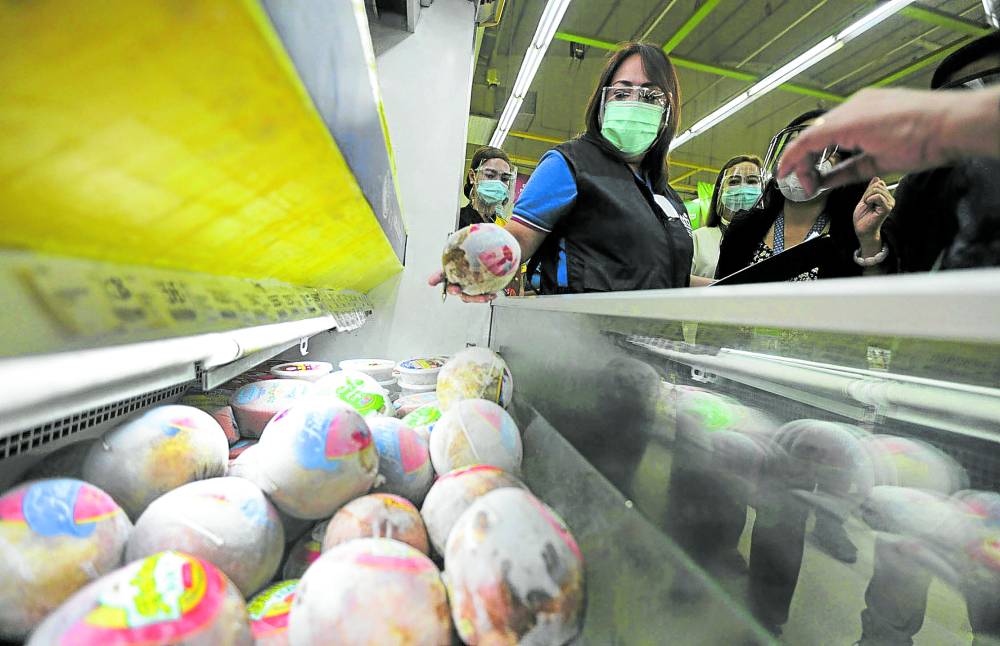
INSPECTION Trade Undersecretary Ruth Castelo inspects the prices of “Noche Buena” items at a supermarket in Quezon City. —INQUIRER FILE PHOTO
MANILA, Philippines — As costs of holiday goods continue to rise, the Department of Trade and Industry (DTI) has recommended consumers to simply choose cheaper and heavier variations of Noche Buena food items.
DTI Undersecretary Ruth Castelo, in an interview during the Laging Handa Public Briefing on Wednesday, said that according to the price list released by their department earlier, there are food items with prices that do not vary much despite differences in net weight — meaning that heavier items are less expensive.
The Department of Trade and Industry (DTI) previously issued a price list of Noche Buena goods.
The most recent price list (as of Wednesday) revealed that most commonly purchased groceries had increased in price.
“You can see in the Noche Buena price guide we released we have the lowest variants – these are the cheapest options, as of now the least expensive item is worth P163; on the same weight, the most expensive is at P650 already,” Castelo said in Filipino.
“But in that one-kilogram ham, if you switch to the one kilogram, you will have something worth up to P892. There are different choices, there are some on the higher end, then there are lower variants that they can choose from,” she added.
READ: Prices of Noche Buena items rise
READ: Price hikes in 12 food items seen
Castelo was referring to an American ham from a local brand that weighs 500 grams, and with a suggested retail price (SRP) of P163. Under the same category, a supposedly more premium ham with the same weight sells for P224.
However, the DTI official was suggesting that people might actually spend less if they were to buy a product that weighs more but costs less overall. For example, a 500-gram ham that sells for P224 will be more expensive than a kilogram of the Noche Buena ham worth P314 — because the first one costs P0.45 per gram while the other one is just worth P0.31 per gram.
Castelo revealed that they have asked producers to hold off on high increases in prices, saying while they understand that production costs are already high, the public in recent months has been battered by high inflation rates.
“We also have a standing appeal for manufacturers that if they can — because we understand that the cost of production is really high these times, but our continuous appeal to them is if they can freeze the price increases or put them at an absolute minimum only,” Castelo said.
“Maybe they can devise a way where manufacturers do not lose profit — we do not want them to lose income but at the same time it should not place a heavy burden on consumers,” he added.
In terms of monitoring markets, Castelo assured that DTI is visiting several markets as a preventive measure against overpricing.
“The DTI has been intensively monitoring prices, especially now with the Christmas season where Noche Buena products may increase. We have a price list showing what the accurate market prices are,” she said.
“Actually we went to the Marikina Public Market and we felt the assistance of the local government unit. Because we saw here, we tested all of the weighing scales using an item weighing one kilogram to see if the scales are calibrated or if the results are correct. We saw that the weighing scales in Marikina are correct, when Secretary Alfredo Pascual tested it, it showed one kilogram,” she added.
Over the past few months, Filipinos have been hard-hit by rising inflation rates. Numbers from the Philippine Statistics Authority (PSA) showed that the headline inflation rate for October was at 7.7 percent — meaning that prices in October 2022 were 7.7 percent more expensive compared to the same period the year prior.
This is the fastest acceleration of inflation rates in around 14 years.
READ: Philippines inflation near 14-year high; more rate hikes seen
To counter that, the government has initiated programs that would provide subsidies to poor families and measures where prices of goods are lowered — like the Kadiwa ng Pasko program initiated by President Ferdinand Marcos Jr., where rice will be sold at P25 per kilogram.
READ: Marcos: Kadiwa ng Pasko stores to sell cheaper goods, rice at P25 per kilo

